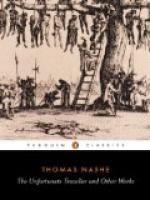|
This section contains 4,659 words (approx. 16 pages at 300 words per page) |

|
SOURCE: "Thomas Nashe and the Functional Grotesque in Elizabethan Prose Fiction," in Studies in Short Fiction, Vol. 15, No. 1, Winter, 1978, pp. 39-48.
Below, Millard discusses the notion of the grotesque in Elizabethan literature and argues that Nashe's The Unfortunate Traveller makes effective use of the grotesque as a structural and thematic center to the work.
Between 1579 and 1600, Elizabethan "novelists" like Thomas Nashe produced what would appear to be little more than rudimentary experiments in their art, yet much of this prose narrative effectively assimilates the grotesque, as episode, character, theme, and image, into its patchwork structures. The combination of crude joke and terrible detail particularly accents the studies of rogue life, tales of adventure, and tracts for the times, even though such moments of horror and farce are often incongruous with either the romantic or the realistic character of these works. As Huntington Brown pointed out in his discussion...
|
This section contains 4,659 words (approx. 16 pages at 300 words per page) |

|


